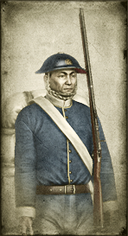
Basic Unit Statistics (can be modified by difficulty level, arts, skills, traits and retainers)
| Recruitment Cost | 1220 | |
| Upkeep Cost | 170 | |
| Melee Attack | 11 | 31% |
| Charge Bonus | 20 | 40% |
| Bonus vs Cavalry | 7 | 23% |
| Range | 125 | 19% |
| Accuracy | 65 | 65% |
| Reloading Skill | 60 | 60% |
| Ammunition | 12 | 15% |
| Melee Defence | 6 | 17% |
| Armour | 2 | 13% |
| Morale | 12 | 24% |
Strengths & Weaknesses
- Very good accuracy and reload rate.
- Good in melee.
- Presence encourages nearby friendly units.
- Very good morale.
Description
These superior troops are the backbone of a modern army fighting for the Shogun.
The guard fight as line infantry, forming up to deliver controlled and accurate volleys of rifle fire into the ranks of the enemy. They are armed with breech-loading rifles, and their foreign advisors have trained them well. The guns will do terrible damage to their targets, and the men can reload at speed and keep up a good rate of fire. They are also confident of their own abilities, and have good morale as a result. A commanding general need have no fear about committing these men to close combat, as they will also give a good account of themselves in melee. The Guard were armed and equipped in the latest French military fashion. This was a deliberate policy, as the French were considered to possess the best army in Europe at the time. This was to be cruelly exposed as a fallacy by the Franco-Prussian War of 1870. All well-informed observers were convinced that the French Army would have little trouble in seeing off the upstart Prussians, especially as the French had a Napoleonic tradition of attacking their enemies to the utmost and, it has to be said, of mostly winning wars. It was therefore a bit of a shock that the Prussians reached Paris in the space of a few weeks, having comprehensively defeated the best army in Europe. This eventually gave Prussia the victory it needed to establish its preeminent position within Germany, the real aim of fighting the war in the first place. Despite the blow to French national prestige, the French continued to export arms and military expertise to the rest of the world, although their customers were a little harder to impress in 1872 than they had been in 1869.